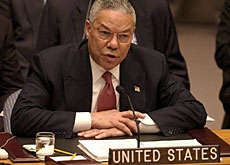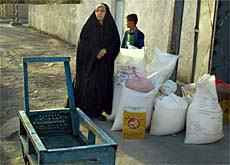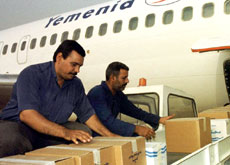International law faces crucial test on Iraq

A United States-led military strike against Iraq - conducted without a UN mandate - would be an infringement of international law, Swiss legal experts have warned.
The US secretary of state, Colin Powell, presented Washington’s case to the UN Security Council on Wednesday in an effort to secure its backing for war.
As debate about the legality of a looming war in Iraq intensifies, many Swiss academics argue that the only way to ensure peace is through respect for international law.
In particular, they point out that the concept of “pre-emptive self-defence”, cited by the Bush administration as the justification for war, is a fiction without a United Nations mandate.
Daniel Thürer, professor of international law at the University of Zurich, says the Iraqi conflict represents a crucial test case for international law.
“If… a second Iraq resolution is passed which authorises the explicit use of force this would be a strengthening of international law,” Thürer told swissinfo.
However, he worries that the world’s remaining super power is in a position to unilaterally overturn international law – although he hopes the US will “comes to its senses” early enough.
“Material breaches”
International legal arguments have flourished in recent weeks, after Washington declared the January 27 report by UN weapons inspectors clear evidence that Iraq had failed to comply with Security Council resolution 1441.
Resolution 1441, passed on November 8, 2002, requires Baghdad to open Iraq to unimpeded weapons inspections and make a full weapons declaration.
On Wednesday, the US secretary of state, Colin Powell, put forward what the US claimed was conclusive evidence of Iraqi “material breaches” against resolution 1441.
Thürer, although concerned about the threat of US unilateralism, does not believe a go-it-alone approach by the Bush administration would mark the end of international law.
Experts, such as Marcelo Kohen from Geneva’s Graduate Institute of International Studies, accuse the US of conducting a “coup d’ètat against international law” – something Thürer believes is overstated.
What’s a UN resolution worth?
Much of the legal debate surrounding the Iraqi crisis centres on questions about the value of UN resolutions in the post-Cold War era.
Albert A. Stahel, professor of political science and strategic studies at Zurich’s Federal Institute of Technology, says UN resolutions have only ever been worth as much as the big powers choose to invest in them.
“Today’s reality, however, is that there is only one world power,” Stahel told swissinfo.
While four other states hold a Security Council veto, traditionally UN sanctions only succeed when the US is on board.
“The Cold War was conducted with relatively few UN resolutions, [largely] because of the balance of power that kept the US and Soviet Union in check,” Stahel says.
These days, there is no such counter-weight, ensuring that resolutions require US backing.
“The exception is the Israeli-Palestinian conflict,” he says.
Europe split
One of the most striking consequences of Washington’s war strategy has been its impact on European unity.
Stahel criticises countries such as Britain, Spain and Italy for backing the US position – irrespective of the consequences for international law.
“[By contrast] France and Germany have made it clear that UN inspectors should be given more time to do their job,” Stahel says.
Consequences for Switzerland
The Swiss position remains firmly opposed to a war, and the government has made it clear that any military action should have UN backing.
Victor-Yves Ghebali, from the Graduate Institute of International Relations, says a US attack on Iraq without a full UN mandate would push Switzerland back to its traditional stance of neutrality.
“In this case, Switzerland would have every reason to stay out of this war because it would be an illegal war,” Ghebali told swissinfo.
“I believe, however, that Switzerland’s traditional [foreign policy] is to side with those opposed to war in order to distinguish itself from those who unquestioningly back the US,” he adds.
War now inevitable?
Despite all the debate about international law and the conduct of foreign policy, many observers now wonder whether war is inevitable.
Heinz Krummenacher, from the Swiss peace foundation swisspeace, believes war cannot be avoided, particularly given the strategic importance of Iraq’s oil reserves, “as well as the president’s hate-fuelled words”.
“Wars can be stopped…but not in this case,” Krummenacher says.
“Mr Bush is on the warpath, while his whole entourage [of] Cheney and Rumsfeld is set on war.”
Swisspeace believes that dangerous assumptions have been made about how a war in Iraq will be played out.
Much of it is based on the 1991 Gulf war, when US-led forces expelled Iraqi troops from Kuwait within weeks – and without significant Allied casualties.
This time around, things could be very different, he warns. “There are positive as well as very negative scenarios,” Krummenacher says.
“But if we could do it, the safest solution would be to avoid this war.”
swissinfo, Jean Michel Berthoud (translation: Jacob Greber)
Colin Powell warned the United Nations Security Council that it risks irrelevancy if it fails to act against Iraq.
Powell made the comment as he presented the council with a raft of new evidence allegedly proving that Iraq has flouted UN weapons resolutions.
He accused Iraq of storing enough chemical agents to fill 16,000 battle-field rockets, and said Saddam Hussein, the Iraqi leader, had authorised his officers to use them.
The address was billed as a potentially pivotal moment in Washington’s push to convince wavering allies of the need for war.
Chronology
8.11.02: UN Resolution 1441 passed.
13.11.02: Saddam Hussein accepts the UN resolution.
27.11.02: UN weapons inspectors begin work in Iraq.
24.12.2002: US mobilises first contingent of 25,000 soldiers to the Gulf.
27.1.03: UN inspectors present their report.
28.1.03: US President Bush puts the case for war in his address to the nation.
By the end of February: US plans to send between 150,000 and 250,000 soldiers to the Gulf.

In compliance with the JTI standards
More: SWI swissinfo.ch certified by the Journalism Trust Initiative



You can find an overview of ongoing debates with our journalists here. Please join us!
If you want to start a conversation about a topic raised in this article or want to report factual errors, email us at english@swissinfo.ch.